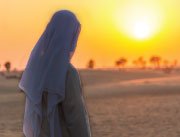Alone in the Crowd: Relating to the Converts of Amon and Moav
| June 14, 2016
A
highlight of the Yom Tov of Shavuos is the public reading of Megillas Ruth which tells the story of a righteous convert from the nation of Moav named Ruth who ultimately marries Boaz and becomes the progenitor of the royal dynasty of Malchus Beis Dovid. The Midrash (Ruth Rabbah 2:14) asks “Why was this megillah written? It teaches us no laws!” It answers that the purpose is “to teach us the great reward for those who act with kindness toward others.” The Alkabetz explains that this midrash refers to the great kindness that Boaz extended toward Ruth by supporting her and her mother-in-law Naomi who were destitute for which he was rewarded by counting Dovid Hamelech among his descendants.
Yet from a passage in the sefer Minchas Chinuch the classic commentary on the Sefer Hachinuch authored by the great Rav Yosef Babad a fascinating question emerges: Was Boaz allowed to treat Ruth in so benevolent a manner? Let us explore the basis for this seemingly strange query.
To Each His Own
The Gemara (Bava Metzia 59b) cites a teaching of Rabi Eliezer Hagadol that in 36 and some say 46 places the Torah cautioned us to treat geirim in a kindly manner to ensure that they do not revert to their former gentile lifestyle.
Do these multiple commandments to love and embrace the convert apply equally to all geirim?
In parshas Ki Seitzei (Devarim 23:4) the Torah addresses how we are to treat geirim from the nations of Amon and Moav. The pasuk states “An Amoni and Moavi shall not enter the congregation of Hashem forever” meaning that we are prohibited from entering into marriage with members of the nations of Amon and Moav. Clearly it is specifically converts from those nations whom the Torah is prohibiting to marry born Jews since there would be no need for the Torah to prohibit marriage with gentiles from Amon and Moav who are already included in the general prohibition on intermarriage with non-Jews.
The three pesukim prior to that one also use those same words “shall not enter the congregation” in regard to other individuals who are prohibited to intermarry with other Jews such as the mamzer. The fact that these four pesukim are grouped together also indicates that just as the mamzer is a full-fledged Jew who is obligated to keep all of the mitzvos yet has certain restrictions as to whom he can marry so too the converts from Amon and Moav are considered full-fledged Jews with restrictions as to whom they can marry.
Clearly converts from Amon and Moav are treated differently from all other converts whom we are permitted to marry. Why?
Equal Rights
Along with the prohibition on marriage to Amoni and Moavi converts the Torah (Devarim 23:5) also provides the reason for this prohibition: “because of the fact that they did not greet you with bread and water on the road when you left Egypt… and because they hired Bilaam… to curse you.” These sins were so severe that they tainted all of their future offspring.

These very words also sparked an halachic debate lasting many generations as to whether the prohibition on intermarriage with other Jews was directed only to male converts from Amon and Moav or to female ones as well. The aforementioned transgressions committed by Amon and Moav — the failure to provide food and drink to Bnei Yisrael and the hiring of Bilaam to curse them — were committed only by the men of these nations. Women were not expected to exit their homes to greet strange travelers with food and water nor were the women involved in the hiring of Bilaam. Therefore it is plausible to believe that the marriage prohibition included only the men of Amon and Moav and not the women. In fact the reason the Torah gives for distinguishing between all converts and those from Amon and Moav can be seen as an advantage for the women among them. (See sidebar)
In early Jewish history when the young Dovid ben Yishai was about to be anointed king some of the highest members of Sanhedrin questioned his qualifications since he was a descendant of Ruth a convert from the nation of Moav. If indeed the marriage prohibition precluded women from marrying into the rest of the Jewish nation Ruth’s marriage would have been invalid thus rendering Dovid unfit for kingship. The Sanhedrin of that time reissued a ruling from previous generations that the marriage prohibition applied only to male converts from Amon and Moav and so it was determined that a female convert from the nations of Amon and Moav was permitted to marry a Jewish person leaving Dovid Hamelech’s illustrious pedigree intact (Yevamos 76b and Minchas Chinuch mitzvah 561 os 2).
Oops! We could not locate your form.

